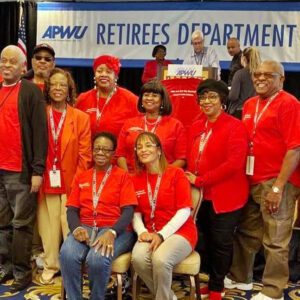August 27, 2024
After a Successful Convention, the Support Services Division Continues Negotiations
We recently completed the APWU’s 27th Biennial National Convention in Detroit, MI. The convention was a productive gathering of union spirit and solidarity that will allow us to energize, mobilize, and organize the APWU and the labor movement. Our National Convention is the highest-ranking authority of our union, and the decisions made by our convention delegates will guide our future and define our union’s identity.
The APWU is, has been, and always will be, a union that fights for better conditions for postal workers and all working people. From the 1970 postal strike, when our forebearers’ work stoppage against poor wages and working conditions resulted in a victory that created our union, until modern times when the APWU demanded that the Postal Service prioritize election mail during the pandemic to ensure that we preserve our democracy, the APWU has always stood for what is right and just. The delegates of our convention used these powerful examples of union strength from our history as a guide to make resolution decisions for our future.
Although the Convention was held in July, the process for locals and state affiliates to submit resolutions for consideration began much earlier. The resolutions are submitted to National for review by a screening committee. The screening committee consists of APWU members appointed by the APWU President. They decide which committee the submitted resolutions will be referred to for consideration.
The additional committees are Labor-Management, Constitution, Formal, Health and Safety, Clerk Division, Maintenance Division, Motor Vehicle Division, Support Services Division and Legislative. Each of these committees’ members are selected from the membership. The committees’ job is to review each resolution from the screening committee and make a recommendation to the convention delegates to either adopt, reject, or refer the resolution.
The convention delegates are decided by each local and state APWU affiliate. The delegates vote on the resolutions after the respective committee presentation, and delegates have an opportunity to speak on the resolution from a microphone in favor of or against resolutions. Delegates may also make changes called amendments to the resolution if the convention delegates vote in favor of amending the resolution. The resolutions can cause spirited and passionate debate prior to the final vote, but once the vote is complete, a decision has been made and we move to the next resolution. The APWU Convention is one of the finest examples of union democracy in the labor movement. We should all be proud that we have a process for our voices to be heard by our delegate representatives.
Now that the convention has concluded, the National Negotiating Committee will continue contract negotiations for the main collective bargaining agreement (CBA) that covers the majority of APWU members. The membership will play a key role in determining how much strength we have at the bargaining table. Your contract campaign actions, in concert with the negotiations, will show postal management that our union negotiators truly express the will of the workers. Contract campaigns are influential at the bargaining table and are great ways to build union solidarity among members.
In addition to negotiating the main contract, the Support Services Division is also currently negotiating several supplemental agreements for private-sector bargaining units. We will also begin to negotiate for the second Human Resources Shared Service Center (HRSSC) Contract on Aug. 29 in Greensboro, NC. As with all contract negotiations, the members have and will be a key force in achieving our goals to improve wages, benefits, and working conditions. The communication between the bargaining unit and the negotiators drives our bargaining goals, while the actions our members take gives us the leverage to make our goals achievable. ■



